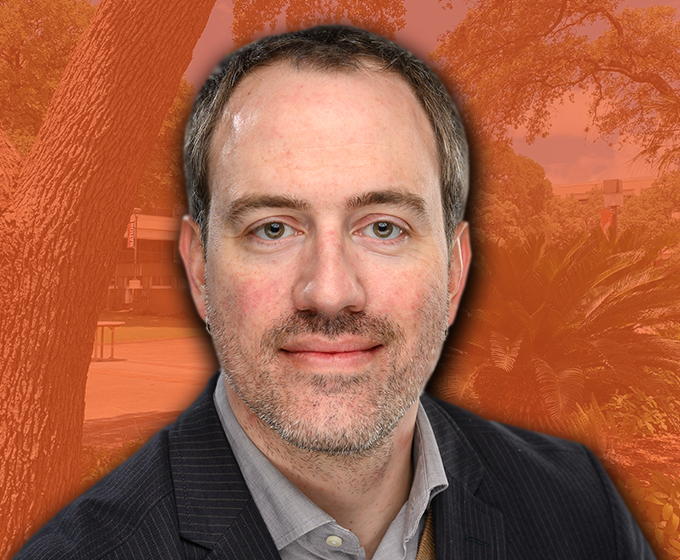
MARCH 5, 2021 — Eric Shattuck, assistant professor of research at the UTSA Institute for Health Disparities Research, is studying the phenomenon of social distancing in response to infectious disease and its effects on pathogen transmission and the health of individuals and communities.
Many animals, including humans, exhibit behavioral changes during the early stages of an infection, including reduced social contacts, called sickness behavior. His findings suggest innate social distancing might help prevent the infection from spreading within social groups.
“The similarities between public health directives and what we see operating on a biological level in nature is remarkable,” Shattuck said.
“For instance, we’ve been advised to keep six feet apart from others to prevent COVID transmission in case they’re asymptomatic carriers of the virus. We know that some ants have a similar strategy, where individual ants increase their physical distance to others after they recognize that there is a possible infection in the colony," Shattuck added. "This shows us that some of the most basic interventions, like social distancing, can be highly effective at preventing outbreaks, whether of COVID-19, flu, or other pathogens.”
This research has been at the center of a study titled “Infectious Diseases and Social Distancing in Nature,” the manuscript for which has been published in the journal Science. Shattuck collaborated with researchers from universities and research centers across the country and in the United Kingdom.
While the other authors have research interests in vampire bats, rodents, insects and more, Shattuck is the only author who studies humans.
“Because humans are highly social creatures with complex and varied cultures — and because culture can affect both our biology and the way that we interpret physical and emotional sensations — I use an anthropological framework that focuses on human biological and cultural variation,” Shattuck said about his research on sickness behavior.
He added that this study can start important conversations across scientific fields about integrating these normal biological responses into our thinking about disease transmission and public health. “People should listen to their bodies if they think they might be sick but we also need to work to ensure that rest, recuperation and isolation aren’t stigmatized or otherwise prevented,” Shattuck said.
In his role with the Institute for Health Disparities Research, Shattuck explores various research projects to further the mission of the Institute, which is to reduce and eliminate health disparities in South Texas through the integration of biomedical and socio-behavioral science approaches.
Another project he’s working on is an investigation of the beneficial effects of hospital arts programs on mood, pain and nausea in adult cancer patients. Along with members of the UTSA music faculty, Tracy Cowden and John Nix, Shattuck is working with the San Antonio nonprofit Hearts Need Art to collect data.
UTSA Today is produced by University Communications and Marketing, the official news source of The University of Texas at San Antonio. Send your feedback to news@utsa.edu. Keep up-to-date on UTSA news by visiting UTSA Today. Connect with UTSA online at Facebook, Twitter, Youtube and Instagram.
Annual Giving will host a First Day of School celebration to welcome students back to campus. We will have giveaways and photo opportunities.
Sombrilla Plaza, Main CampusEnjoy snacks while connecting with Adobe reps and student ambassadors. Download or log into the Adobe Express app to snag swag and unlock exclusive back-to-school templates. It’s a fun, fast way to get creative and start the school year with bold moves.
Central Plaza, Main CampusCelebrate the merger of UTSA and UT Health San Antonio with a pop-up featuring free t-shirts, exclusive swag, and interactive photo opportunities. Open to all students, faculty and staff. Supplies are limited!
Sombrilla Plaza, Main CampusHuddle Against Hunger is a fundraising competition with Texas State that benefits our Roadrunner Pantry. Donations this week will help UTSA earn additional prize monies provided by RBFCU.
In-Person and VirtualJoin UTSA Libraries for an update on federal public access policies and how the library can assist with compliance.
Virtual EventWe invite you to join us for Birds Up! Downtown, an exciting welcome back event designed to connect students with the different departments at the Downtown Campus. Students will have the opportunity to learn about some of the departments on campus, gain access to different resources, and collect some giveaways!
Bill Miller PlazaThere are many citation managers. Which one is right for you? This workshop will explain what a citation manager is and how it can help you organize your citations, insert citations as you write your paper, and generate your bibliography.
Virtual EventThe University of Texas at San Antonio is dedicated to the advancement of knowledge through research and discovery, teaching and learning, community engagement and public service. As an institution of access and excellence, UTSA embraces multicultural traditions and serves as a center for intellectual and creative resources as well as a catalyst for socioeconomic development and the commercialization of intellectual property - for Texas, the nation and the world.
To be a premier public research university, providing access to educational excellence and preparing citizen leaders for the global environment.
We encourage an environment of dialogue and discovery, where integrity, excellence, respect, collaboration and innovation are fostered.